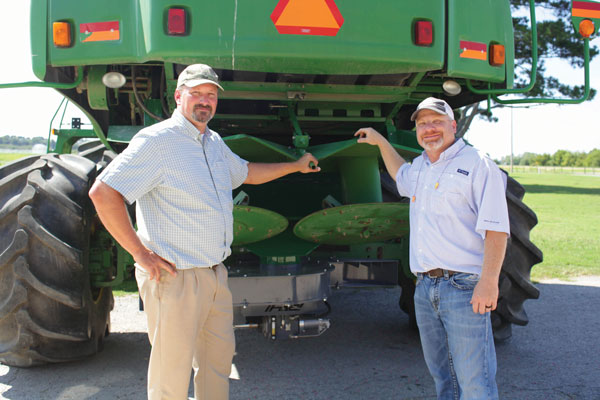
‘Seed Destructor’ Technology Likely the Next Step in war on Weeds
November 15, 2018
Written By Ryan McGeeney
For decades, the fight against weeds in Arkansas agriculture—barnyardgrass and Palmer amaranth, in particular—has been an ongoing war of attrition as weed populations gradually acquire resistance to one herbicidal chemistry after another.

During this time, weed scientists and other experts with the University of Arkansas System Division of Agriculture have encouraged growers to adopt cultural practices and other alternatives to relying solely on chemistries for weed control, ranging from the use of crop rotation and cover crops to reduced row spacing.
As harvest approaches, Arkansas researchers are embarking on a multiyear trial that will test the efficacy of a new iteration of machinery known as the Integrated Harrington Seed Destructor and its ability to aid the practice known as harvest weed seed control. The practice is intended to prevent weed seeds from making their way back to the seed bank during harvest, thus denying them the opportunity to germinate and grow in the following season.
Originally designed as a trailer-mounted unit pulled behind a harvest combine on its own trailer, the new seed destructor being tested on large research plots at the Newport Extension Center is retrofitted into a John Deere 9760 STS. The destructor is powered by mechanical energy generated through a belt system attached to the combine’s straw chopper. The destructor’s grinder mill, which turns at about 3,100 revolutions per minute, effectively pulverizes anything put through it, ejecting a fine powder in its final stage.
Jason Norsworthy, a weed scientist with the University of Arkansas, said the integrated version of the equipment—originally designed and implemented in Australia, where farming conditions tend to be more arid—was a more practical choice for Arkansas farmers over the original design.
“In 2016, we tested a prototype on 12 common Arkansas weeds,” Norsworthy said. “On 11 of those 12, we had a 99 percent kill rate or better. On the 12th, we had a 97 percent kill rate.”
Extension weed scientist Tom Barber pointed out that at the time of the seed destructors widespread adoption in Australia, the nation had run out of control options for rigid ryegrass in wheat and other cereals.
“We’re not completely out of options yet in the mid-South, but we’re running short on options,” Barber said. “We have pigweed populations in our state that are resistant to four different modes of action, especially in northeast Arkansas. So we’re looking for that next thing that’s not chemical. A new cultural practice that can reduce weed seed going back into the seed bank, which will, in turn, reduce the numbers we have to deal with the following year.
“This time of year, you’ll see a lot of Palmer amaranth in soybean and cotton fields—some in rice fields,” he said. “With this piece of equipment, the idea is that the majority of those seeds will go into the mill and be destroyed, and that’s less that we have to deal with in the subsequent crop.”
Palmer amaranth—commonly known as pigweed—has long been the bane of Arkansas growers’ existence. The integrated seed destructor may prove especially effective in cutting into the weed’s survival since 99 percent of the weed’s seed is retained on the plant itself, a helpful fact when the plant is utterly pulverized during the destruction process.
Barnyardgrass, on the other hand, only retains about a third of its seeds, making it more difficult to impact the weed’s soil bank numbers. Nevertheless, Norsworthy and Barber believe seed destructors have the potential to significantly reduce the weed seed bank.
“With Palmer amaranth, 95 percent or more of it will be gone from the seed bank within three years,” Norsworthy said. “So by limiting these new introductions, we’re going to quickly reduce the seed bank. It’s not only Palmer amaranth, though. Things like barnyardgrass are going to be relatively short-lived in the seed bank.”
The researchers warned, however, no single practice should be treated as a cure-all.
“There’s some research in Australia that shows that if you only focus on weed seed control, after repeating that tactic year after year, you can select for resistance to the destructor, if it’s the only tactic you use in the field,” Norsworthy said. “This is just a tool, not a stand-alone system. It’s a tool we can integrate into our current system that’s going to help us sustain the utility of the herbicides we have today.”
“We don’t have any new modes of action—herbicides—being developed,” Barber said. “It’s been 30 years since a new mode of action was developed. We don’t think our solutions in the future are going to come out of a jug, at least long term, because we’ve been on this resistance trend for at least 10 years now.”
Norsworthy and Barber said they’d like to have at least three years of data on destructor efficacy in the state, and the first year will likely present a steep learning curve.
“We know that this technology works well in Australia,” Barber said. “But this is Arkansas. Our combines have to have four-wheel drive, and massive tires. Sometimes we just have to ‘cut in the mud.’”
“There’s always going to be bugs in a system and learning what its limitations are,” Norsworthy said. “Beyond that, we’re looking forward to understanding what effect it’s having on the soil seed bank, and how we’re utilizing that in a cropping system.”

